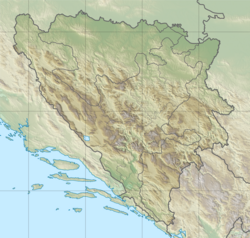Konjic Mithraeum
Konjički mitrej | |
| Alternative name | Konjički Mithraeum |
|---|---|
| Location | Repovica Hill, Konjic |
| Region | Herzegovina-Neretva Canton |
| Coordinates | 43°39′41″N 17°57′53″E / 43.6614648°N 17.964752°E |
| Type | Temple, sanctuary |
| Length | around 9 metres (30 ft) |
| Width | around 5 metres (16 ft) |
| Height | floor level is at ground level |
| History | |
| Founded | early 4th century AD |
| Abandoned | Not known |
| Periods | Roman Imperial |
| Site notes | |
| Excavation dates | January 1897 |
| Archaeologists | Karlo Patsch |
| Ownership | Public |
The Konjic Mithraeum, or Konjički Mithraeum (Serbo-Croatian: Konjički mitrej), is a Mithraeum, a temple dedicated to God of the Sun, Mithra, discovered in Konjic, Bosnia and Herzegovina.
History
[edit]The mithraeum in Konjic was a temple dedicated to God of the Sun, Mithra. The god was worshiped and cult of Mithraism spread to other parts of Roman Empire, throughout the Mediterranean basin, by slaves and merchants from the Orient, and by Roman soldiers who came into contact with the followers of the cult in the East.[1][2][3]
Discovery and protection
[edit]The remains of the Mithraeum in Konjic were discovered January 1897. The Konjic site is atypical as its floor level is at ground level. This means that temple main characteristic is absence of cave, hollow ground or even constructed spelaea. The Mithraism followers sought as a norm to found their places of worship in caves, whereas in absence of such topographical features they would excavate the soil, where the terrain permitted, and built small single-celled temple, known as spelaea, to reinforce the impression of a cave. However, in case of Konjic, temple was established on open ground, and only protection and seclusion was provided by dense forest, which disappeared by times of its discovery.[3]
See also
[edit]References
[edit]- ^ Basler, Đuro (1972). Arhitektura: kasnoantickog doba u Bosni i Hercegovini (in Bosnian and Croatian). Veselin Masleša. p. 65. Retrieved 22 September 2018.
- ^ Bojanovski, Ivo (1988). Bosna i Hercegovina u antičko doba (in Bosnian and English). Akademija nauka i umjetnosti Bosne i Hercegovine. ISBN 9788671230193. Retrieved 22 September 2018.
- ^ a b Karlo Patsch (1 October 1897). "Mithraeum u Konjicu". infobiro.ba (in Bosnian). INFOBIRO - DIGITALNI ARHIV: Glasnik Zemaljskog muzeja Bosne i Hercegovine. Retrieved 23 September 2018.

